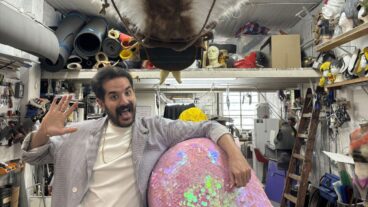A scene from Uri Rosenwacs’ film ‘The Film Class’.A Bedouin woman is making socially-aware films that take a hard look at the problems faced by her community in Israel’s Negev desert, thanks to a grant from an Israeli non-governmental organization and a film class run by an Israeli film-maker.
Kamla Abu-Zaela, who lives in Rahat, a Bedouin city of 40,000 approximately 15 miles north of Beersheva, is the recipient of the 2006 Yaffa London-Ya’ari scholarship. The award was established by the New Israel Fund, a Jerusalem-based NGO, to honor Yaffa London-Ya’ari, who helped initiate the provision of social services in Israel’s founding years. The $5,000 scholarship is intended to fund a project that fulfils the NIF’s mandate of assisting grassroots activists to improve lives and conditions within their communities.
“Bedouin women are brave, and they struggle,” said Abu-Zaela, 31, an English teacher who has a newborn baby and two sons of school age, told ISRAEL21c. “We encounter many different problems, particularly as we are working within a very traditional society.”
Abu-Zaela has already made two short films which chronicle aspects of life in her community. The first, Gamila, daughter of Rahat‘, tells the story of a Bedouin woman living in Rahat who, unable to speak Hebrew, finds it very difficult when she has to go to a hospital in Beersheva with stomach pains. An empowerment class gives her the help she needs to improve her education and raise her self-esteem. The second film, Salach, tackles the issue of peer pressure amongst young Bedouin boys.
The issue currently preoccupying Abu-Zaela is polygamy, widespread in the Bedouin community. Sharia law, the religious law that governs Muslim life, allows for a man to take up to four wives, with the condition that he can financially take care of them all. Her elder sister married a man who already had a wife, and Kamla watched her sister suffer as a result.
“Taking a second wife in this society is common,” says Abu-Zaela. “I think this problem is actually getting worse! Tradition says women should accept the situation and shut up! Unfortunately, our tradition supports men even if they are in the wrong.”
Abu-Zaela plans to use her award money to make a film tackling polygamy head-on. She is now completing the script, and the local office of Shatil, the New Israel Fund’s empowerment and training center, is mentoring her, and nearby Sapir College is providing creative and technical support. She plans to have the film ready by next April.
Abu-Zaela, who has been teaching English at a local elementary school for nine years, was first introduced to filmmaking by Israeli director Uri Rosenwaks. Beersheva native Rosenwaks came to Rahat at the request of the headmaster from his former school to set up a filmmaking class for Bedouin women, aided by Majid Alkamalat, who heads local non-governmental organization Tsaad Kadima (A Step Forward). The class met weekly, with twelve women in it, whose age ranged from 18 to 30.
“I wanted to do a project not about people, as my profession has taught me to do, but with people. This project fulfilled that wish for me,” Rosenwaks told ISRAEL21c.
Rosenwaks found the experience of teaching the group of young Bedouin women so fascinating that he made a film about it. The Film Class, which has just been released, that follows the group as they use film to explore their identity through interviews with tribal elders, and how they cope with the consequences of the information they discover.
The Film Class documents the moment when, halfway through the film, Rosenwaks discovers to his amazement that the group members know almost nothing about their own history as “black” Bedouin – darker-skinned Bedouin tribes that originated in North Africa and were brought to the Middle East as slaves – and for which they suffer racism within the Bedouin community. To help teach the women about their history, Rosenwaks raises funds and persuades them to travel with him to Zanzibar to see exactly where their ancestors came from and where their slavery began in the 19th century, which he documents in the film.
Unfortunately, due to family and work commitments, Kamla Abu-Zaela didn’t join the group on this trip. However, the film class inspired her to produce her own films about her community.
“She is remarkable,” says Rosenwaks. “She really shows initiative, and will succeed.”
“When I first met Uri,” says Abu-Zaela, “I wrote a script and emailed it to him. He immediately gave me very good feedback. Uri clearly cares about the Bedouin community and learns quickly. This is why we accepted him and like him very much.”
Although Rosenwaks is now busy promoting the film here and abroad, and is developing other projects, he is also involved in the creation of a community TV station in Rahat, with ambitions for a full film production house to create educational and feature films. The Film Class is playing to appreciative audiences in cinemas across Israel, and members of the film group are showing the film in local communities and networks, and generating income for future films.
Due to the efforts of Abu-Zaela, Rosenwaks, and others, the lives of Bedouin communities in Rahat and elsewhere are increasingly being opened up to scrutiny on camera. Abu-Zaela’s passion and commitment are an inspiration. “I want to change my society,” she says. “I see all these things as being able to make a little change… now that I can express myself [through film]. I have many ideas.”












